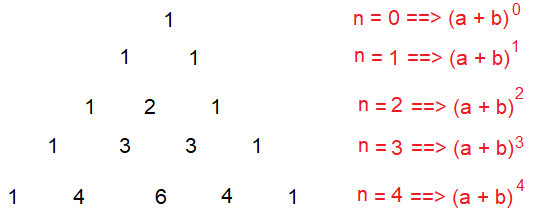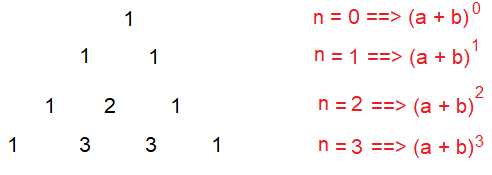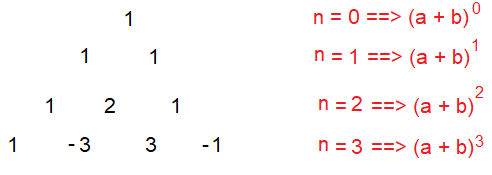FIND CUBE OF BINOMIAL USING PASCALS TRIANGLE
Subscribe to our ▶️ YouTube channel 🔴 for the latest videos, updates, and tips.
Consider the following expanded powers of (a + b)n, where a + b is any binomial and n is a whole number. Look for patterns.

Each expansion is a polynomial. There are some patterns to be noted.
1. There is one more term than the power of the exponent, n. That is, there are terms in the expansion of (a + b)n.
2. In each term, the sum of the exponents is n, the power to which the binomial is raised.
3. The exponents of a start with n, the power of the binomial, and decrease to 0. The last term has no factor of a. The first term has no factor of b, so powers of b start with 0 and increase to n.
4. The coefficients start at 1 and increase through certain values about "half"-way and then decrease through these same values back to 1.
Use the binomial expansion of (a + b)³ to expand and simplify:
Problem 1 :
(x + 1)³
Solution :

From the pascal triangle above,
(a + b)³ = a³ + 3a²b + 3ab² + b³
a = x and b = 1
(x + 1)³ = x³ + 3(x)²(1) + 3(x)(1)² + 1³
(x + 1)³ = x³ + 3x² + 3x + 1
Problem 2 :
(3x - 1)³
Solution :
a = 3x and b = 1
Since we have negative in the middle, we have to use negative for alternative terms.

(3x - 1)³ = (3x)³ - 3(3x)²(1) + 3(3x)(1)² - 1³
(3x - 1)³ = 27x³ - 27x² + 9x - 1
Problem 3 :
(2x + 5)³
Solution :
a = 2x and b = 5
(2x + 5)³ = (2x)³ + 3(2x)²(5) + 3(2x)(5)² + (5)³
(2x + 5)³ = 8x³ + 60x² + 150x + 125
Problem 4 :
(2x + 1/x)³
Solution :
a = 2x and b = 1/x
(2x + 1/x)³ = (2x)³ + 3(2x)²(1/x) + 3(2x)(1/x)² + (1/x)³
(2x + 1/x)³ = 8x³ + 12x + 6/x + 1/x³
Problem 5 :
Expand and simplify:
(1 + √2)³
Solution :
a = 1 and b = √2
(1 + √2)³ = 1³ + 3(1)²(√2) + 3(1)(√2)² + (√2)³
(1 + √2)³ = 1 + 3√2 + 6 + 2√2
(1 + √2)³ = 7 + 5√2
Problem 6 :
Find the second term of the expansion (x + 16)³
Solution :
(x + 16)³
a = x, b = 16
Second term = 3a³b
= 3(x)²(16)
= 48x²
Problem 7 :
If (x - 2y)³ = Ax³ + Bx² + Cx + D
find A + B + C + D.
Solution :
(x - 2y)³ = Ax³ + Bx² + Cx + D
a = x, b = 2y
(x - 2y)³ = x³ - 3(x²)(2y) + 3x(2y)² - (2y)³
= x³ - 6x²y + 3x(4y²) - (8y³)
= x³ - 6x²y + 12xy² - 8y³
A = 1, B = -6, C = 12 and D = -8
A + B + C + D = 1 - 6 + 12 - 8
= 13 - 14
= -1
Subscribe to our ▶️ YouTube channel 🔴 for the latest videos, updates, and tips.
Recent Articles
-
Finding Range of Values Inequality Problems
May 21, 24 08:51 PM
Finding Range of Values Inequality Problems -
Solving Two Step Inequality Word Problems
May 21, 24 08:51 AM
Solving Two Step Inequality Word Problems -
Exponential Function Context and Data Modeling
May 20, 24 10:45 PM
Exponential Function Context and Data Modeling